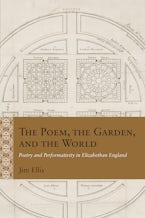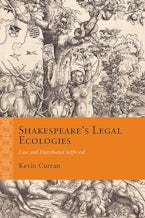LITERARY CRITICISM / Renaissance
Showing results 1-8 of 8
Filter Results OPEN +

The Poem, the Garden, and the World
The Poem, the Garden, and the World traces the Renaissance-era relationship of place and movement from garden to poetry to a confluence of the two.
The Two-Soul'd Animal
The Two-Soul'd Animal argues that the Renaissance imagination of the "human" was a subjectivity that crowded two souls into one body, making the subject ill at ease in one’s own skin.
Critical Prefaces of the French Renaissance
Critical Prefaces of the French Renaissance contains nearly 30 prefaces from the works of French poets and dramatists published from 1525 to 1611. Bernard Weinberg’s helpful book collects...
Milton's Modernities
Milton’s Modernities is a collection of eleven original essays that examine questions of modernity in the work and legacy of the British poet John Milton.
Site Unscene
Site Unscene: The Offstage in English Renaissance Drama demonstrates that Renaissance playwrights pioneered a hybrid form of representation by shifting pivotal dramatic scenes into imaginary, offstage spaces and replacing them with stories told by characters onstage.
Shakespeare’s Legal Ecologies
Shakespeare's Legal Ecologies examines the key role that the law and legal frameworks played in the ways Shakespeare explored character and selfhood.
Faithful Translators
With Faithful Translators Jaime Goodrich offers the first in-depth examination of women’s devotional translations and of religious translations in general within early modern England. Placing female translators such as Queen Elizabeth I and Mary Sidney Herbert, Countess of Pembroke, alongside their male counterparts, such as Sir Thomas More and Sir Philip Sidney, Goodrich argues that both male and female translators constructed authorial poses that allowed their works to serve four distinct cultural functions: creating privacy, spreading propaganda, providing counsel, and representing religious groups.
The Aesthetics of Service in Early Modern England
In The Aesthetics of Service in Early Modern England, Elizabeth Rivlin explores the ways in which servant-master relationships reshaped literature. The early modern servant is enjoined to obey his or her master out of dutiful love, but the servant's duty actually amounts to standing in for the master, a move that opens the possibility of becoming master. Rivlin shows that service is fundamentally a representational practice, in which the servant who acts for a master merges with the servant who acts as a master.

The Poem, the Garden, and the World
The Poem, the Garden, and the World traces the Renaissance-era relationship of place and movement from garden to poetry to a confluence of the two.
The Two-Soul'd Animal
The Two-Soul'd Animal argues that the Renaissance imagination of the "human" was a subjectivity that crowded two souls into one body, making the subject ill at ease in one’s own skin.
Critical Prefaces of the French Renaissance
Critical Prefaces of the French Renaissance contains nearly 30 prefaces from the works of French poets and dramatists published from 1525 to 1611. Bernard Weinberg’s helpful book collects...
Milton's Modernities
Milton’s Modernities is a collection of eleven original essays that examine questions of modernity in the work and legacy of the British poet John Milton.
Site Unscene
Site Unscene: The Offstage in English Renaissance Drama demonstrates that Renaissance playwrights pioneered a hybrid form of representation by shifting pivotal dramatic scenes into imaginary, offstage spaces and replacing them with stories told by characters onstage.
Shakespeare’s Legal Ecologies
Shakespeare's Legal Ecologies examines the key role that the law and legal frameworks played in the ways Shakespeare explored character and selfhood.
Faithful Translators
With Faithful Translators Jaime Goodrich offers the first in-depth examination of women’s devotional translations and of religious translations in general within early modern England. Placing female translators such as Queen Elizabeth I and Mary Sidney Herbert, Countess of Pembroke, alongside their male counterparts, such as Sir Thomas More and Sir Philip Sidney, Goodrich argues that both male and female translators constructed authorial poses that allowed their works to serve four distinct cultural functions: creating privacy, spreading propaganda, providing counsel, and representing religious groups.
The Aesthetics of Service in Early Modern England
In The Aesthetics of Service in Early Modern England, Elizabeth Rivlin explores the ways in which servant-master relationships reshaped literature. The early modern servant is enjoined to obey his or her master out of dutiful love, but the servant's duty actually amounts to standing in for the master, a move that opens the possibility of becoming master. Rivlin shows that service is fundamentally a representational practice, in which the servant who acts for a master merges with the servant who acts as a master.








